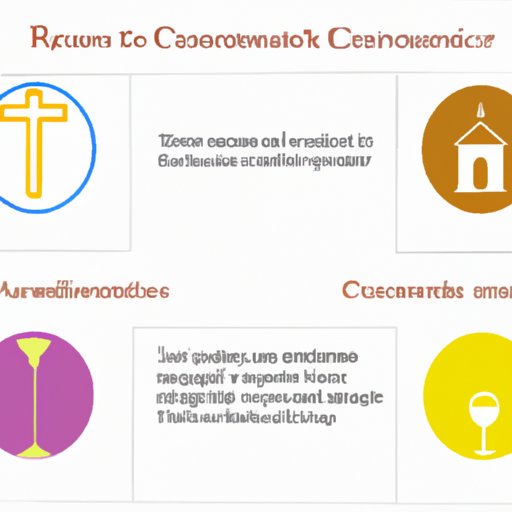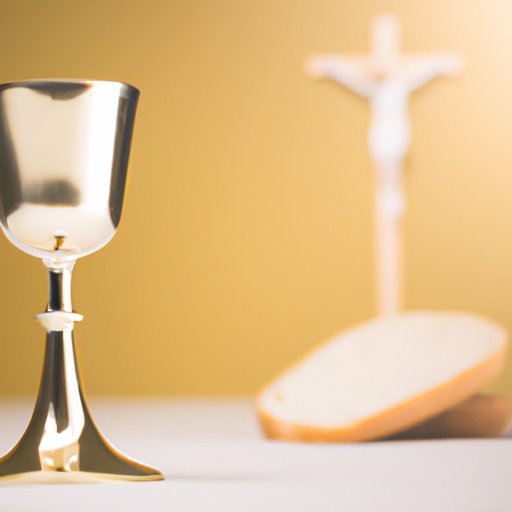Understanding the Eucharist: History, Significance, and Controversies
The Eucharist, also known as Holy Communion or the Lord’s Supper, is a central sacrament in the Christian faith. Christians believe that the Eucharist is a commemoration of the Last Supper, where Jesus shared bread and wine with his disciples. In this article, we will explore the history and significance of the Eucharist, as well as some of the doctrinal differences and controversies surrounding this holy sacrament.
History and Religious Significance of the Eucharist
The origins of the Eucharist can be traced back to the Last Supper, which Jesus shared with his disciples before his crucifixion. During the meal, Jesus took a loaf of bread, blessed it, and broke it, giving it to his disciples, saying, “Take, eat, this is my body”. He then took a cup filled with wine and told his disciples to drink from it, adding, “This is my blood, which is shed for you.”
Over time, this practice became an important part of Christian tradition, as Christians believed that the bread and wine were symbols of Jesus’ body and blood. Christians also believe that the Eucharist is a way to remember the sacrifice that Jesus made on the cross, and to celebrate his resurrection.
The Eucharist is also closely linked to the concept of sacraments in Christian theology. Sacraments are seen as outward and visible signs of inward and spiritual grace, and the Eucharist is one of the seven sacraments recognized by the Catholic Church. Similarly, many other Christian denominations, including Orthodox and Anglican churches, also consider the Eucharist to be a sacrament.
One of the most controversial aspects of the Eucharist is the concept of transubstantiation. This doctrine, which is upheld by the Roman Catholic Church, states that during the Eucharist, the bread and wine are transformed into the actual body and blood of Christ, even though they appear to remain bread and wine. Many Protestant denominations reject the idea of transubstantiation, instead seeing the Eucharist as a symbolic commemoration of Jesus’ sacrifice.
Personal Reflection on the Meaning of the Eucharist
As a Christian, the Eucharist has been an important part of my spiritual life. Participating in Communion allows me to reflect on Jesus’ sacrifice and to renew my commitment to following his teachings. Through the ritual of the Eucharist, I feel deeply connected to the community of believers, both past and present.
For me, the Eucharist represents a powerful symbol of God’s love and mercy. In sharing in the bread and wine, I am reminded that Jesus sacrificed himself for all humanity, and that we are called to extend that same love and compassion to others.
Doctrinal Differences and Similarities between Different Christian Denominations
The Eucharist has been a source of doctrinal disagreement among Christians for centuries. While most Christian denominations recognize the importance of Communion, they differ in their interpretation of its meaning and significance.
As mentioned earlier, one of the main doctrinal differences surrounding the Eucharist is the concept of transubstantiation. While the Catholic Church upholds this doctrine, many Protestant denominations believe that the bread and wine are only symbolic representations of Jesus’ body and blood.
Another area of disagreement is in the frequency and manner in which Communion is celebrated. Some denominations, such as the Catholic Church, celebrate Communion during every Mass, while others celebrate it less frequently. Some denominations also use different elements, such as grape juice instead of wine, in order to accommodate members with different needs.

Comparative Analysis of the Eucharist in Different Religious Traditions
While the Eucharist is a central sacrament in Christianity, other religious traditions also have rituals that involve bread and wine.
In Judaism, for example, bread and wine play important roles in the Sabbath and Passover ceremonies. During Sabbath, Jews traditionally bless loaves of bread and offer wine in prayer. During Passover, Jews commemorate the exodus from Egypt by drinking four cups of wine and eating unleavened bread.
In Islam, bread and wine are not used in a sacramental context, but they are mentioned in the Quran as part of the story of Jesus’ life. Muslims often break bread during the Iftar meal that marks the end of Ramadan, and in some cases, white grape juice is used in place of wine to maintain the spirit of the occasion without involving alcohol.
Critique of the Values and Ethics Associated with the Eucharist
While the Eucharist is regarded by many Christians as a holy sacrament, it has also been the focus of controversy and criticism in recent years.
One of the most significant criticisms of the Eucharist is that it can sometimes be used as a tool of exclusion. Some faith communities have strict rules about who can participate in Communion, and this can create feelings of hurt and rejection for those who do not meet the criteria. There has also been criticism of the way in which Communion is sometimes used to promote political or social agendas.
Despite these criticisms, many Christians continue to find great value in the Eucharist. For many, it represents a powerful symbol of community, sacrifice, and the love of God.
Symbolism of Bread and Wine in the Eucharist
The bread and wine used in the Eucharist are rich in symbolism and meaning. For Christians, they represent the body and blood of Christ, and are seen as a powerful reminder of Jesus’ sacrifice and love.
The bread is seen as a symbol of Jesus’ body, which was broken for humanity’s sake. Through the ritual of the Eucharist, believers are invited to remember the pain and suffering that Jesus endured in order to save humanity from sin and death.
The wine is seen as a symbol of Jesus’ blood, which was shed on the cross. Through the ritual of the Eucharist, believers are invited to remember the depth of Jesus’ love for humanity and to reflect on the ways in which they can embody that same love in their own lives.
Recent Controversies Surrounding the Practice of the Eucharist
Despite being a central tenet of the Christian faith, the Eucharist has not been immune to controversy in recent years. One of the most significant debates has centered around the question of who is allowed to participate in Communion.
Some denominations have traditionally been more inclusive, allowing anyone to participate in Communion regardless of whether they are baptized or a member of the church. However, other denominations have stricter rules, requiring individuals to be members of the church or to adhere to certain beliefs before they can participate.
There has also been debate around the use of non-alcoholic wine (grape juice) in Communion, particularly for those who struggle with alcoholism or who come from cultures where alcohol is prohibited.
Conclusion: Revisiting the Importance of the Eucharist
The Eucharist is a complex and multifaceted sacrament that holds deep meaning for Christians around the world. Whether we interpret the bread and wine as literal or symbolic representations of Christ’s body and blood, the Eucharist invites us to reflect on the depth of God’s love and the sacrifice that Jesus made for humanity.
Despite its controversies, the Eucharist remains an essential part of Christian tradition, and its power to inspire and unite faithful believers is as strong as ever. Through the ritual of the Eucharist, we are reminded of our shared values and commitments, and are invited to renew our commitment to living lives of compassion, service, and love.
